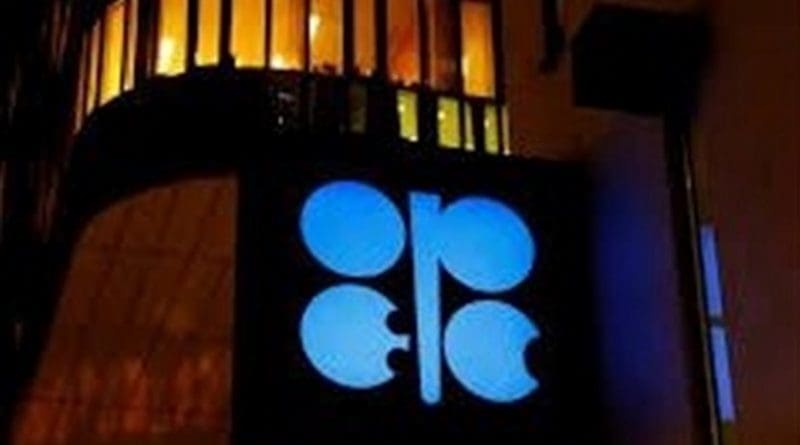Russia, The Ukraine Crisis, And The Oil Market – OpEd
With the heaviest bombardment on European soil since the Second World War and a 40-mile-long Russian convoy of tanks and infantry fast-approaching Kyiv, the scenes coming out of Ukraine are gripping the world in suspense and fear.
Russian aggression is also polarizing the international community between those strongly condemning and sanctioning this unprovoked invasion, and those balancing their interests between the West and the Kremlin. It is critical that the global politicization of Europe’s first major war this century does not spill over into purposefully apolitical organizations; namely, OPEC.
Crude oil holds a prominent position in the global commodities market because oil price changes impact the global economy.
Thus, countries or groups that produce crude oil directly impact economies worldwide. The Organization for Petroleum Exporting Countries (OPEC) was founded in 1960 to coordinate and unify petroleum policies in order to secure an efficient and regular supply of petroleum.
As Russian forces entered Ukraine last week, crude oil prices soared above $100 a barrel for the first time since mid-2014. The massive financial sanctions the EU, UK, US, Japan, and other major countries have imposed on Russia following the invasion are most likely aimed at dismantling Russia’s wartime chest.
The most damaging sanction yet has been the freezing of Russia’s central bank foreign exchange reserves. Without access to this $650bn pot, Russia’s ability to conduct monetary policy to stabilize its economy is severely, if not completely, hampered.
As a result, Putin will have to seek other methods to inject liquidity into the economy. In late 2016, as the world was facing an extensive oil glut, ten countries joined OPEC to form OPEC+ and better coordinate output cuts. Among these countries were Azerbaijan, Kazakhstan, and Russia. In light of the West’s unified and sweeping sanctions on Russia, the addition of these latest members may have opened the international cartel to a looming division. A number of OPEC countries are traditional Russian allies – including Venezuela and Iran. The addition of Russia and Central Asian states like Azerbaijan and Kazakhstan into OPEC+ probably shifts the coalition even further to the Russian sphere of influence. Yet, it is paramount that OPEC+ remains an apolitical organization.
As international sanctions start to take greater effect, they will not only impact the Russian economy but also its relations with its allies in OPEC+.
Russia is the main trading partner for Azerbaijan and Kazakhstan and a significant source of military equipment for Iran. This may push these countries to prioritize pleasing the Kremlin ahead of ensuring the harmony of OPEC+ production targets. Take Kazakhstan for example. After a decision to deregulate the price of liquified petroleum at the beginning of this year, a series of anti-government protests swept the country. These grew into the biggest protests since the country’s independence in 1991. The Kazakhstani government responded with violent and repressive actions. President Tokayev then invited in Russian troops through the CSTO to “stabilize” the country and arrested thousands of peaceful protestors in the process.
When the West implemented its initial sanctions against Russia over the invasion of Crimea in 2014, trade between Kazakhstan and Russia fell by over 24% and seriously dampened Kazakhstan’s economy.
This time around, the Kazakhstani government will do anything to avoid damaging its economy which would cause further dissatisfaction with Tokayev’s regime and spark more protests. Local sentiment is already highly disapproving of the government, especially after the Kazakhstani Prosecutor General’s officeadmitted that six people have died from torture while in custody since the beginning of January. The arbitrary detention of thousands of Kazakhstanis is further fueling local frustration with the regime. An additional economic crisis could be the tipping point that ends Tokayev’s short tenure.
As the Russian economy begins to falter, without access to its FX reserves, Putin will have to deploy the country’s most valuable commodity, oil and gas, to finance the war. When the Kremlin increases oil production, supply chain disruptions will keep the price of oil arbitrarily high. As this impacts Kazakhstan’s economy, Tokayev will more likely have no choice but to follow Putin’s course and also increase oil production, as much as anything to avoid losing his grip on power.
This week, OPEC+ met to review the agreed upon 400,000 barrels per day increase in oil production starting in April. Russia agreed with the decision, for now. Whether it will stick with this decision later is questionable. If it does decide to increase production further, going against OPEC+ members, Kazakhstan, Azerbaijan, and other Russian sympathizers may well follow.
A fracture within OPEC+ would most likely spell disaster for the stability and economies of the Gulf and would further divide the international community. OPEC’s success has been grounded in its ability to remain apolitical.
Putin and his pawns risk ruining the stability in the oil market that has been so difficult to achieve over the last decade.
*Dr. Majid Rafizadeh is the president of the International American Council, a Harvard-educated Iranian-American political scientist, and an advisory board member of Harvard International Review. He can be reached at [email protected]

